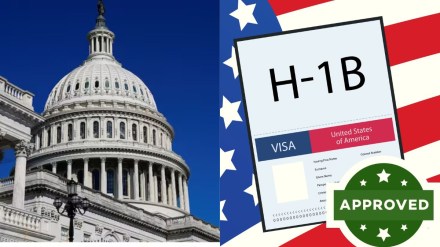The United States government has entered a shutdown after the Senate failed to pass a crucial spending bill. This means that many federal agencies, including those responsible for immigration, have ceased operations or scaled back services.
With a shutdown potentially lasting for an extended period, H-1B visa holders and those in the process of applying for or renewing their H-1B visas might face a number of uncertainties.
What is a government shutdown?
A government shutdown occurs when Congress fails to pass a budget or funding resolution for federal agencies, leading to a suspension of non-essential government services.
Essential services, such as those related to national security, law enforcement, and public health, continue during the shutdown, but many other government functions are disrupted or suspended.
For immigration-related processes, the shutdown means a halt to many activities, especially those dependent on annual budgets rather than fee-based funding.
Impact of the shutdown on H-1B visa holders
The impact of the current shutdown on H-1B visa holders and applicants could be significant but uneven. Some visa processes will continue, while others are put on hold.
Additionally, a new application fee of $100,000, introduced in September 2025, applies to new H-1B petitioners.
This fee only impacts new applicants and not current visa holders or those seeking visa renewals. However, this added cost, along with shutdown-related delays, creates further uncertainty for employers and new applicants.
The biggest issue facing H-1B applicants is the Department of Labour’s (DOL) inability to approve Labour Condition Applications (LCAs), a crucial step in the H-1B petition process.
One area that remains unaffected by the shutdown is the US Citizenship and Immigration Services (USCIS). The agency will continue operations despite the lack of government funding.
“USCIS is not affected at all. The reason it’s not affected is that it’s fee-based. We are paying the fees to run the agency,” explained Houston-based immigration attorney Rahul Reddy, told Indian Express.
Because USCIS is operational, green card processes, visa renewals, and certain ongoing immigration cases can continue.
However, there is a key limitation when it comes to H-1B petitions: that is, new applications and extensions that require a Labour Condition Application cannot be filed during the shutdown.
The Department of Labour (DOL) plays a critical role in the H-1B visa process by certifying Labour Condition Applications (LCAs), which are required for employers to file new H-1B petitions or extensions.
Unfortunately, the DOL has suspended its operations due to the shutdown, making it impossible for employers to obtain an approved LCA. “Without an approved LCA, no new H-1B petitions or extensions can be filed,” Reddy told The Indian Express
This means that for any H-1B holder whose visa is expiring or who is seeking an extension, the clock is ticking.
“If my H-1B is expiring on October 10, and if I were to file an H-1B application, I can’t file right now because even if I file a Labour Condition Application, there is no approval,” Reddy explained to The Indian Express.
The absence of LCA approvals will delay the filing of extensions, transfers, and amendments.
Another key question is the status of H-1B amendments. For example, if an employee needs to change their work location (such as moving from one state to another), an amendment must be filed.
The shutdown affects the ability to file these amendments if they require a new LCA.
For H-1B visa holders currently in the U.S., the shutdown does not prevent them from travelling in and out of the country.
Their visa status remains valid, and Customs and Border Protection (CBP) will continue operations at airports and land crossings, as border security is considered important.
